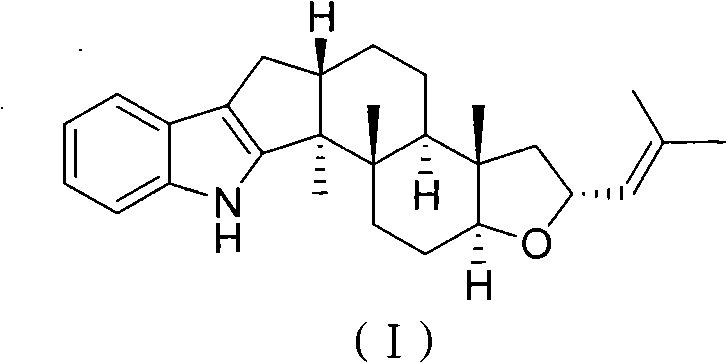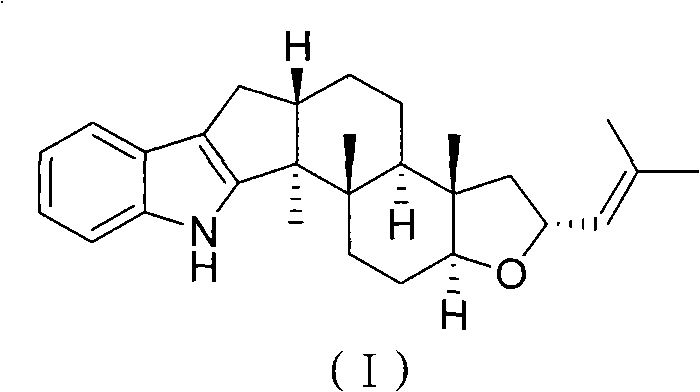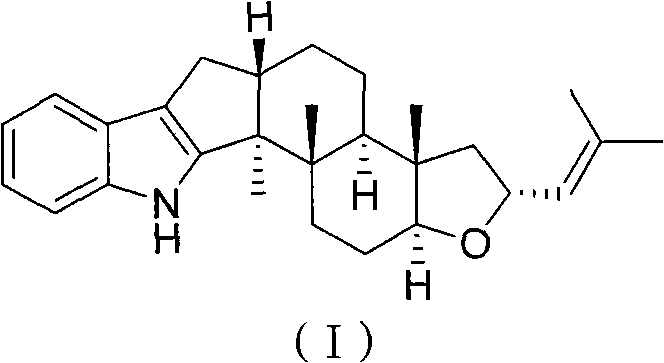Application of diterpene alkaloid compound serving as secondary metabolite of seaweed endophytic fungus
A technology for secondary metabolites and diterpene alkaloids, which is applied in the application field of diterpene alkaloids, which are secondary metabolites of seaweed endophytic fungi, can solve problems such as serious residues, soil pollution, biological and human health hazards, etc.
- Summary
- Abstract
- Description
- Claims
- Application Information
AI Technical Summary
Problems solved by technology
Method used
Image
Examples
Embodiment 1
[0017] The diterpene alkaloid compound, a secondary metabolite of seaweed endophytic fungus represented by the formula (I), has an insecticidal effect and can be used as an insecticide.
[0018]
[0019] Insecticidal activity test:
[0020] Artemia (Brine Shrimp), also known as Salt Artemia, belongs to Arthropoda in classification, Crustacea, Anocaria, Salt Artemia family, Artemia genus, Artemia as an important and good experimental animal material, has been received widespread attention. The insects cultivated in the laboratory under controlled conditions were used to evaluate the insecticidal activity of the compounds.
[0021] Hatching of Artemia eggs: Take 100 mg of Artemia eggs and put them in a 500ml beaker, add 400ml of artificial seawater, inflate slowly with a small air pump, and incubate at room temperature for 24 hours, remove egg shells and unhatched eggs, and Artemia The larvae were continued to be cultivated for 24 hours and set aside.
[0022] Artemia biol...
Embodiment 2
[0027] The preparation method of the diterpene alkaloid compound shown in formula (I):
[0028] Take the well-grown fungus Aspergillus oryzae (Asp.oryzae) cf-2 strain on the plate, which was preserved in the China Center for Type Culture Collection CCTCC on March 1, 2010, the preservation number is CCTCC M2010045, and the strain number is cf-2 Cut into small pieces and inoculate in PDB liquid medium, put 300mL medium in each 1L Erlenmeyer flask, 30 bottles in total, ferment at room temperature for 23 days, add 1 / 2 volume of ethyl acetate to kill fungi, filter, The mycelia and fermentation broth were collected separately. The PDB liquid medium consists of 200 milliliters of potato juice per liter, 20 grams of glucose, 5 grams of peptone, 3 grams of yeast extract, 500 milliliters of aged sea water, and 300 milliliters of distilled water.
[0029] Collect about 9L of the fermentation broth, extract three times with ethyl acetate, and concentrate under reduced pressure; after cru...
Embodiment 3
[0035] The difference from Example 2 is that
[0036]Take the well-grown Aspergillus oryzae (Asp. Day, add 1 / 2 volume of ethyl acetate to kill fungus, filter, collect mycelia and fermentation broth respectively. The PDB liquid medium consists of 200 milliliters of potato juice per liter, 20 grams of glucose, 5 grams of peptone, 3 grams of yeast extract, 500 milliliters of aged sea water, and 300 milliliters of distilled water.
[0037] Collect about 9L of fermented liquid, extract three times with ethyl acetate, concentrate under reduced pressure; extract three times with acetone after the mycelia is pulverized, then extract with ethyl acetate, concentrate under reduced pressure; The concentrate obtained by combining the fermented liquid and the mycelium is 8 g of the crude extract. The crude extract was subjected to 200-300 mesh silica gel column chromatography, with petroleum ether-acetone at 100:0, 50:1, 20:1, 15:1, 10:1, 5:1, 1:1 to 0: The gradient of 100 was eluted, an...
PUM
 Login to View More
Login to View More Abstract
Description
Claims
Application Information
 Login to View More
Login to View More - R&D
- Intellectual Property
- Life Sciences
- Materials
- Tech Scout
- Unparalleled Data Quality
- Higher Quality Content
- 60% Fewer Hallucinations
Browse by: Latest US Patents, China's latest patents, Technical Efficacy Thesaurus, Application Domain, Technology Topic, Popular Technical Reports.
© 2025 PatSnap. All rights reserved.Legal|Privacy policy|Modern Slavery Act Transparency Statement|Sitemap|About US| Contact US: help@patsnap.com



